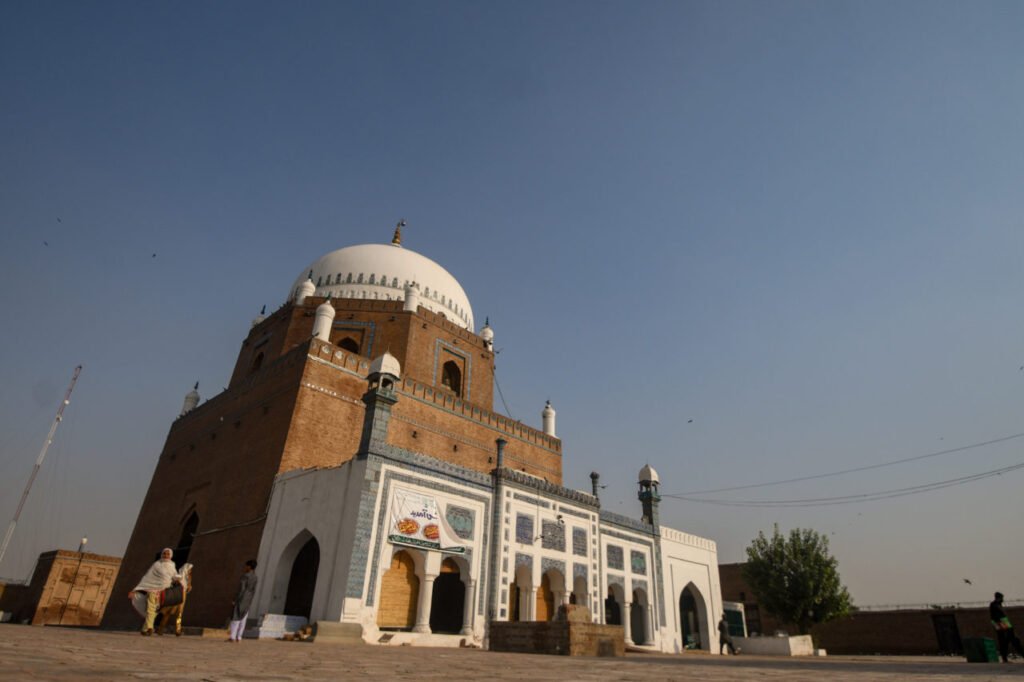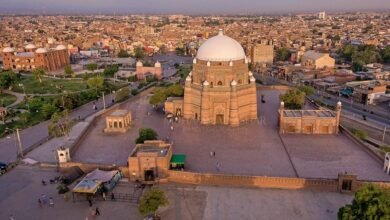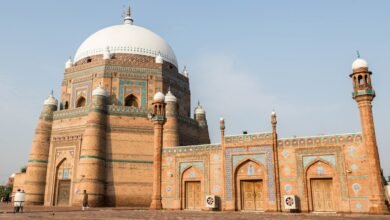
Multan’s Literary Heritage, Multan, the ancient city steeped in history and culture, holds a rich literary heritage that has influenced generations of writers. From its early literary traditions to its contribution to contemporary literature, Multan has nurtured a vibrant literary ecosystem. In this article, we will delve into Multan’s literary connections, exploring the city’s significant contributions to Urdu, regional languages, and the broader literary landscape of Pakistan.
Multan, situated in the heart of Pakistan’s Punjab province, has a long and illustrious history dating back thousands of years. This ancient city has witnessed the rise and fall of empires and has been a hub of cultural and intellectual activity throughout its existence. Among its many cultural facets, Multan boasts a literary tradition that spans centuries, making it a treasure trove for literature enthusiasts.
Read More: Multan’s Textile Industry: A Legacy of Fine Fabrics
Historical Background of Multan
Multan’s Literary Heritage, To understand Multan’s literary heritage, it is essential to delve into its historical background. Multan has been a center of trade, scholarship, and creativity since ancient times. It was an important stop along the historic Silk Road, attracting merchants, scholars, and travelers from various regions. The city’s strategic location facilitated the exchange of ideas, knowledge, and literary works, fostering a diverse literary tradition.
Multan’s Literary Legacy
Multan’s Literary Heritage, Multan’s literary legacy can be traced back to ancient times when the city served as a melting pot of cultures and ideas. Early literary traditions in Multan were heavily influenced by Persian and Arabic literature. Scholars and poets from Multan contributed to the development of Persian poetry and prose, leaving an indelible mark on the literary landscape of the region.

Early Literary Traditions
Multan’s Literary Heritage, During the medieval period, Multan witnessed the flourishing of Sufi poetry, with prominent Sufi saints like Shah Shams Tabrez and Bahauddin Zakariya playing a significant role in shaping Multan’s literary scene. Their teachings and mystical poetry inspired a new wave of spiritual and philosophical thought, influencing poets and writers for generations to come.
Notable Literary Figures from Multan
Multan’s Literary Heritage, Multan has produced several notable literary figures who have contributed significantly to the Urdu and regional literary traditions. One such luminary is the legendary poet and philosopher, Khawaja Ghulam Farid. His soul-stirring verses in Saraiki language continue to resonate with readers today, showcasing Multan’s profound influence on regional literature.
Multan’s Libraries and Bookshops
Multan’s Literary Heritage, Multan’s literary heritage is not only preserved in the works of its writers but also in its libraries and bookshops. These institutions provide a haven for book lovers, offering access to a vast collection of literary works spanning various genres and languages.
Historical Libraries
Multan’s Literary Heritage, Multan is home to several historical libraries that have preserved ancient manuscripts, rare books, and literary treasures. The Khuda Bakhsh Oriental Library, founded in 1884, houses a vast collection of manuscripts in Arabic, Persian, and Urdu. It serves as a valuable resource for scholars and researchers interested in exploring Multan’s literary past.
Modern Libraries and Bookshops
Multan’s Literary Heritage, In addition to the historical libraries, Multan boasts modern libraries and bookshops that cater to the needs of contemporary readers. The Multan Public Library and the Multan Book Emporium are popular destinations for book enthusiasts, offering a wide range of books in Urdu, English, and regional languages.

Literary Events and Festivals in Multan
Multan’s Literary Heritage, To celebrate Multan’s literary heritage and foster a thriving literary community, the city hosts various literary events and festivals throughout the year. These events provide a platform for writers, poets, and literary enthusiasts to come together, share their work, and engage in intellectual discourse.
Annual Literary Events
One of the most prominent literary events in Multan is the Annual Multan Literary Festival. This festival attracts renowned writers, poets, and intellectuals from across Pakistan and beyond. It features panel discussions, book launches, poetry recitals, and interactive sessions, creating a vibrant atmosphere for literary exchange.
Literary Festivals
Multan’s Literary Heritage, Apart from the annual literary festival, Multan also hosts smaller literary festivals that focus on specific genres or themes. These festivals bring together literary communities, encouraging dialogue and collaboration among writers and readers. The festivals also provide an opportunity for emerging writers to showcase their work and gain recognition.
Multan’s Contribution to Urdu Literature
Multan’s influence on Urdu literature is undeniable. The city has been a breeding ground for renowned Urdu poets, novelists, and playwrights, enriching the Urdu literary canon with their unique perspectives and creative brilliance.
Urdu Poetry in Multan
Multan has produced several prominent Urdu poets who have left an indelible mark on the world of poetry. From the romantic verses of Qateel Shifai to the soulful poetry of Ibn-e-Insha, Multan has nurtured poetic talent that resonates with readers on a deep emotional level. The city’s mystical ambiance and rich cultural heritage continue to inspire Urdu poets to this day.
Urdu Prose and Fiction
Multan’s literary contributions extend beyond poetry. The city has also given birth to acclaimed Urdu novelists and fiction writers. Writers like Ghulam Abbas, Bano Qudsia, and Khalida Hussain have captivated readers with their thought-provoking narratives and insightful storytelling. Multan’s literary legacy in Urdu prose and fiction remains an integral part of Pakistan’s literary heritage.
Multan’s Role in Regional Languages
While Urdu holds a prominent place in Multan’s literary landscape, the city has also played a crucial role in nurturing regional languages, particularly Punjabi and Saraiki.
Punjabi Literature in Multan
Multan has been a hub of Punjabi literary activity for centuries. The city has witnessed the emergence of renowned Punjabi poets and writers who have contributed to the richness of Punjabi literature. From the classical poetry of Baba Farid to the modern works of Shiv Kumar Batalvi, Multan has been a wellspring of Punjabi literary talent.

Saraiki Literature in Multan
Saraiki, a regional language spoken in southern Punjab, finds its roots in Multan. The city’s cultural and linguistic diversity has nurtured Saraiki literature, giving rise to notable Saraiki poets and writers. The works of luminaries like Khawaja Ghulam Farid and Altaf Hussain Hali have elevated Saraiki literature to new heights, adding to Multan’s literary legacy.
Multan’s Impact on Contemporary Literature
Multan continues to be a source of inspiration for contemporary writers, shaping their artistic sensibilities and influencing their creative output. The city’s rich cultural heritage, historical significance, and literary traditions have a profound impact on the work of writers hailing from Multan.
Contemporary Writers from Multan
Multan has produced a new generation of writers who are making waves in the literary world. Writers like Kishwar Naheed, Anwar Masood, and Khalid Iqbal Yasir have gained recognition for their exceptional literary contributions. Their works reflect the essence of Multan, capturing its mystique, heritage, and cultural nuances.
Multan’s Influence on Their Work
For writers from Multan, the city’s literary heritage acts as a constant source of inspiration. The historical landmarks, Sufi shrines, and the vibrant cultural milieu provide a fertile ground for their imagination. Multan’s literary legacy seeps into their narratives, lending authenticity and depth to their storytelling.
Promoting Multan’s Literary Heritage
To ensure the preservation and promotion of Multan’s literary heritage, various efforts are underway. Cultural organizations, government initiatives, and passionate individuals are working collectively to safeguard Multan’s literary legacy for future generations.
Preservation Efforts
Preservation of historical manuscripts, rare books, and literary artifacts is of utmost importance in safeguarding Multan’s literary heritage. Libraries and cultural institutions are employing conservation techniques and digitization methods to preserve these invaluable literary treasures.
Cultural Organizations and Initiatives
Cultural organizations in Multan are actively engaged in promoting literature and providing platforms for writers and artists to showcase their work. These organizations organize literary seminars, workshops, and competitions to foster a literary culture and encourage creativity.
Conclusion
Multan’s literary heritage is a testament to the city’s vibrant cultural legacy. From its ancient roots to its modern-day contributions, Multan continues to inspire writers, poets, and readers alike. The city’s literary connections, be it in Urdu, regional languages, or contemporary literature, are a testament to its enduring influence on the literary landscape of Pakistan. By preserving and celebrating Multan’s literary heritage, we ensure that its rich tradition of storytelling and creativity lives on.
Read More: Multan’s Handicrafts: A Treasure Trove of Traditional Artistry
FAQs
1. What are some famous books written by authors from Multan?
Authors from Multan have penned several renowned books. Some notable works include Khawaja Ghulam Farid’s “Diwan-e-Farid” (Saraiki poetry), Bano Qudsia’s “Raja Gidh” (Urdu novel), and Anwar Masood’s “Mela Akhian Da” (Punjabi poetry).
2. Are there any literary landmarks to visit in Multan?
Yes, Multan boasts several literary landmarks worth visiting. These include the tomb of Khawaja Ghulam Farid, Shah Shams Tabrez’s shrine, and the Khuda Bakhsh Oriental Library, where ancient manuscripts are preserved.
3. How can I participate in literary events in Multan?
To participate in literary events in Multan, you can stay updated with event announcements through social media, local newspapers, and literary organizations. Many events are open to the public, providing an opportunity to engage with the literary community.
4. Are there any literary festivals held in Multan?
Yes, Multan hosts various literary festivals throughout the year, including the Annual Multan Literary Festival. These festivals celebrate literature, provide a platform for authors, and offer enriching experiences for literary enthusiasts.
5. Can I find books in regional languages in Multan’s libraries?
Yes, Multan’s libraries cater to a diverse range of readers. You can find books in regional languages like Punjabi and Saraiki, along with Urdu and English, in Multan’s libraries and bookshops.








2 Comments